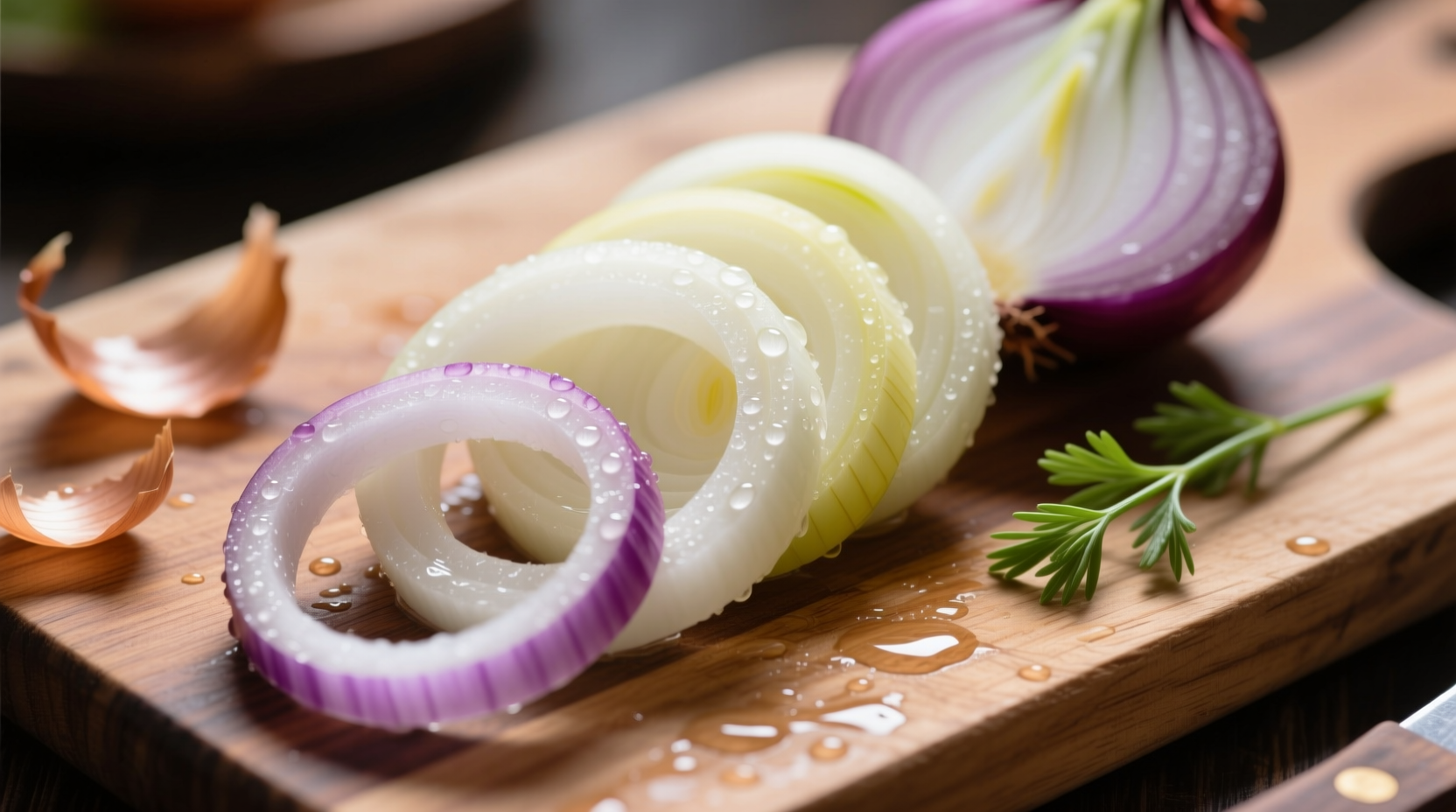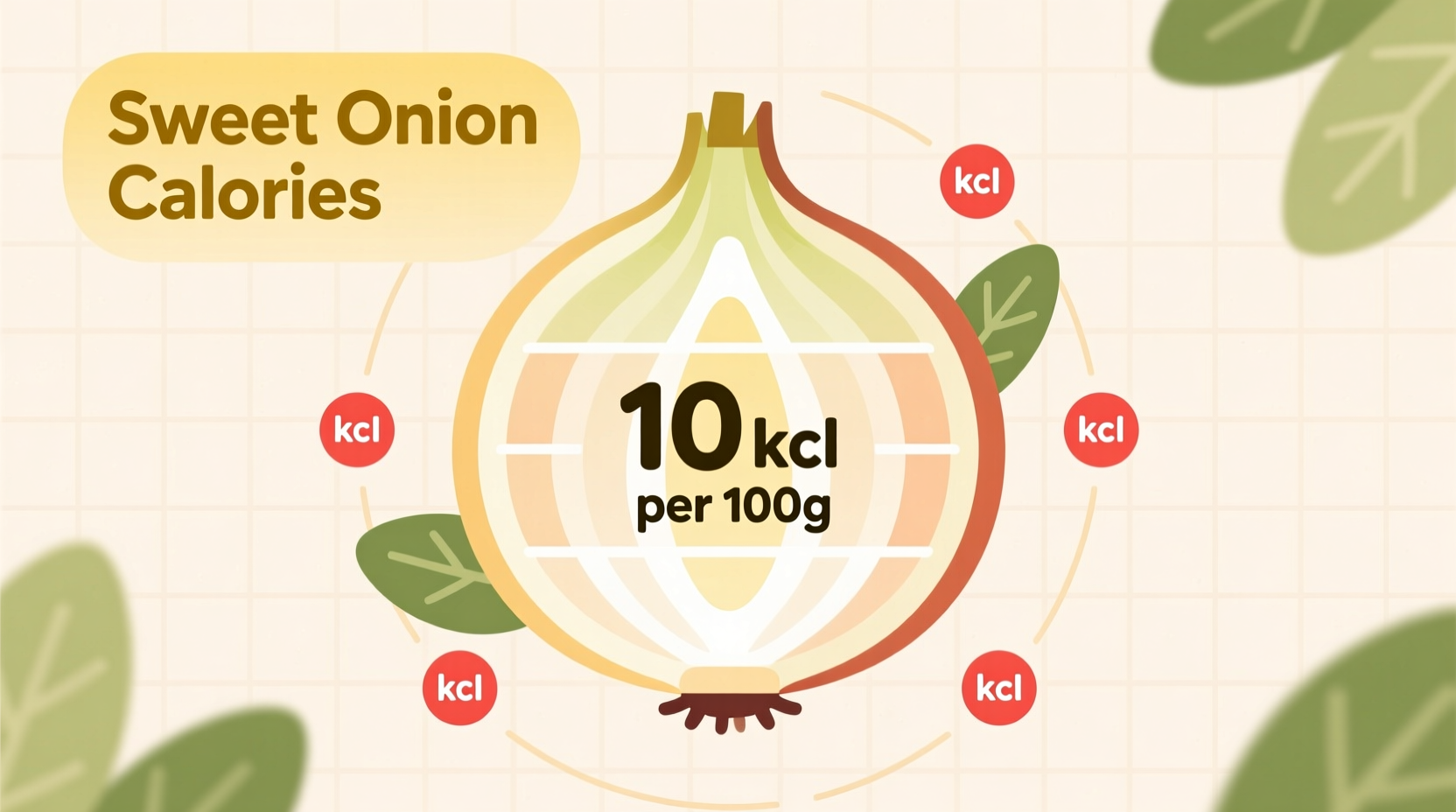When you're watching your calorie intake but still want to add flavor to your dishes, sweet onions become a kitchen staple worth understanding. Unlike their sharper counterparts, these mild-flavored alliums deliver culinary versatility without overwhelming your daily nutritional goals.
Why Sweet Onions Stand Out Nutritionally
Sweet onions—primarily Vidalia, Walla Walla, and Texas Sweet varieties—grow in low-sulfur soil that creates their distinctive mild flavor. This growing condition doesn't just affect taste; it influences their nutritional composition compared to yellow or red onions.
| Onion Type | Calories (per 100g) | Carbohydrates (g) | Sugar (g) | Fiber (g) |
|---|---|---|---|---|
| Sweet Onion | 40 | 9.3 | 5.0 | 1.7 |
| Yellow Onion | 42 | 9.7 | 4.2 | 1.9 |
| Red Onion | 43 | 10.0 | 4.2 | 2.0 |
| Green Onions | 32 | 7.3 | 2.9 | 2.6 |
Data sourced from USDA FoodData Central shows that while sweet onions contain slightly more natural sugars than other varieties, their overall calorie profile remains remarkably similar. The difference lies primarily in flavor compounds rather than significant nutritional variation.
Breaking Down Sweet Onion Nutrition
Understanding what comprises those 60 calories in a medium sweet onion helps you make informed dietary choices:
- Carbohydrates (14.6g) - Primarily natural sugars and fiber that provide sustained energy
- Fiber (2.7g) - Approximately 10% of your daily recommended intake supporting digestive health
- Vitamin C (11.8mg) - 13% of daily value, crucial for immune function and skin health
- Vitamin B6 (0.16mg) - 9% of daily value, important for metabolism and brain health
- Potassium (196mg) - 6% of daily value, essential for proper muscle and nerve function
Unlike processed foods, sweet onions deliver these nutrients with zero fat, minimal sodium (4mg), and no cholesterol—making them an excellent addition to heart-healthy diets.

Practical Applications in Your Daily Diet
Knowing sweet onion calories matters most when you're applying this information to real-world eating scenarios. Here's how to maximize their culinary and nutritional benefits:
Raw Consumption Benefits
Unlike sharper onion varieties that often require cooking to mellow their flavor, sweet onions can be enjoyed raw in salads, salsas, and sandwiches without causing digestive discomfort for most people. When eaten raw:
- Maximum vitamin C retention occurs (cooking reduces vitamin C content by 15-25%)
- Their natural sweetness complements fresh greens without requiring added sugars
- They provide crunch and texture without significant calorie addition
Cooking Considerations
When caramelizing sweet onions, be mindful that their higher sugar content means they'll brown more quickly than yellow onions. For low-calorie cooking:
- Use 1-2 tablespoons of water instead of oil to prevent sticking
- Cook over medium-low heat for 25-30 minutes to develop natural sweetness
- A single medium sweet onion yields approximately ½ cup of caramelized onions at just 60 calories
How Sweet Onions Fit Into Popular Diet Plans
Different dietary approaches incorporate sweet onions in specific ways based on their carbohydrate profile:
- Keto Dieters: Limit to ¼ cup raw (about 10g carbs) to stay within daily limits
- Mediterranean Diet: Freely include as both raw and cooked component
- Diabetes Management: Pair with protein sources to moderate blood sugar impact
- Weight Loss: Use as flavor enhancer to reduce need for higher-calorie seasonings
Registered dietitians often recommend sweet onions as a "flavor bridge" for people transitioning to healthier eating habits because their mild taste makes vegetables more appealing without added calories.
Storage Tips to Maintain Nutritional Value
Proper storage preserves both flavor and nutrient content:
- Store whole, unpeeled sweet onions in a cool, dark place with good air circulation
- Refrigerate cut onions in airtight containers for up to 7 days
- Avoid storing near potatoes, which emit gases that accelerate onion spoilage
- Freeze chopped sweet onions for up to 6 months (blanch first for best texture)
Research from the USDA Agricultural Research Service confirms that proper storage maintains vitamin content for up to two months, while improper conditions can reduce nutritional value by up to 30% in just two weeks.
Common Questions About Sweet Onion Nutrition
Based on frequent inquiries from home cooks and health-conscious eaters, here are answers to the most pressing questions about sweet onion calories and nutrition.











 浙公网安备
33010002000092号
浙公网安备
33010002000092号 浙B2-20120091-4
浙B2-20120091-4